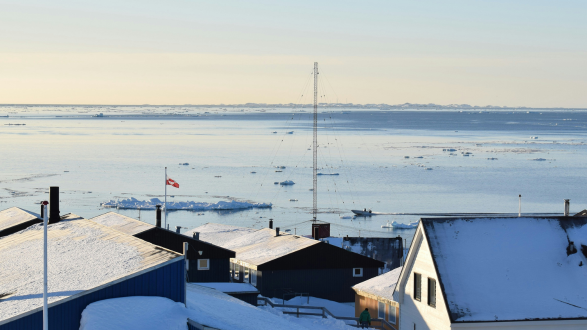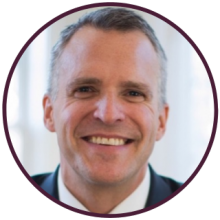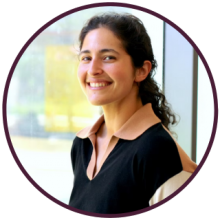Online Webinar
On Tuesday, October 7, at 8 am PT, the Pacific Council welcomes our membership to dial in for a discussion of the current relationship between the U.S. and Greenland, and implications for Greenland’s potential bid for independence from Denmark. Members will hear from Rufus Gifford, Former Chief of Protocol of the United States and Former U.S. Ambassador to Denmark, Dr. Gabriella Gricius, a Senior Fellow at the Arctic Institute and Postdoctoral Fellow at the University of Konstanz, and Allison Agsten the Inaugural Director of USC Annenberg’s Center for Climate Journalism and Communication and Affiliate of the Arctic Initiative at the Harvard Kennedy School’s Belfer Center.
Greenland remains a key player in shaping the geopolitical and economic future of the Arctic region. Once a distant outpost, Greenland now sits at the center of conversations about Arctic security, critical minerals, Indigenous sovereignty, and remains of high strategic and political interest to the U.S.
Why it’s important:
- In August, the top U.S. diplomat in Copenhagen was summoned over claims that Americans had been conducting clandestine operations in Greenland in an effort to support the country’s separation from Denmark.
- Due to increased security concerns, Denmark is expanding its military presence on Greenland. The Arctic Light 2025 exercise is active through Sept. 19, during which time the Danish Armed Forces will deploy the frigate Niels Juel, two EH-101 helicopters, and two F-16 fighter jets.
- Greenland is strategically important due to its proximity to Europe, access to waterways connecting Russia and China, and the presence of rare earth minerals.
- The European Commission proposed doubling its financial aid to Greenland as part of the next EU budget. Under the multi-annual financial framework for 2028–2034, the Commission is proposing over €530 million in funding for Nuuk.
Please send questions in advance to events@pacificcouncil.org.
To register for this webinar, visit the Zoom Registration Page.
Guest Speaker
Rufus Gifford is a former U.S. Ambassador, senior aide to Presidents Obama, Biden, and Vice President Harris, civic leader, public speaker, and advocate for Democratic causes.Most recently, Gifford served as Finance Chair of the Biden-Harris and Harris-Walz Campaigns, amassing a record 2.2 billion dollars for the effort. Prior to that, he was the Chief of Protocol of the United States with the rank of Ambassador and Deputy Campaign Manager for Biden for President in 2020, with a focus on finance, external outreach, and coalition building. Aside from Presidential politics, he is focused on promoting civic engagement, particularly among youth and issue areas ranging from U.S. public diplomacy to renewable energy.
From 2013 to 2017, Rufus served as the U.S. Ambassador to Denmark, where he led efforts to address the effects of climate change, build international coalitions, and invest in clean energy. He was awarded the Grand Cross of the Order of the Dannebrog by Her Majesty Queen Margrethe II of Denmark for his meritorious service.
His pioneering tenure as Ambassador has been profiled in the Wall Street Journal, the Atlantic, CNN, and Vice News, among many other national and international outlets, and he has spoken extensively across Europe and the United States about his efforts to break down walls and humanize the work of government
Prior to Government service, Rufus was the National Finance Director for President Barack Obama’s 2012 re-election campaign. During Obama’s first term, Rufus was the National Finance Director at the Democratic National Committee and supported the passage of a number of Obama policy initiatives. Before that, he was an aide on Obama’s historic 2008 presidential campaign.
A native of Massachusetts, Rufus holds a bachelor’s degree from Brown University. He is married to veterinarian Dr. Stephen DeVincent, and they live in Concord, Massachusetts, with their Golden Retrievers, Svend and Odin.
Guest Speaker
Gabriella Gricius, PhD, is a Senior Fellow at the Arctic Institute, a Postdoctoral Fellow at the University of Konstanz, and a Fellow and the Media Coordinator with the North American and Arctic Defence and Security Network (NAADSN).
She received her Ph.D. from Colorado State University’s Political Science Department, where her dissertation explored the prevalence of low-tension discourse in Greenland, Svalbard, the Northern Sea Route, and the Northwest Passage. Her research interests broadly cover international relations, Arctic security, the potential for desecuritization during great power competition, and the role of experts in security decision-making processes.
Outside of academia, she also works with the European Leadership Network (ELN) on research on hybrid threats, and is a Fellow with the Younger Generation Leaders Network on Euro-Atlantic Security (YGLN). She was recently a participant with the Newport Arctic Scholars Initiative and a Summer Associate with the RAND Corporation. Her writing is published in Foreign Policy, the Journal of Contemporary European Studies, International Politics, European Security, Global Studies Quarterly, among other outlets.
Previously, she was a Guest Researcher at both the University of Copenhagen and the Fridtjof Nansen Institute, a Fellow with Bridging the Gap, a Junior Lecturer at Vrije Universiteit Amsterdam, a Senior Research Associate at the Public International Law and Policy Group’s Netherlands Office, and worked with the International Criminal Court and the Hague Center for Strategic Studies. She received her BA from Boston University and her MA from Rijksuniversiteit Groningen.
Moderator
Allison Agsten is the inaugural director of USC Annenberg’s Center for Climate Journalism and Communication, where she develops initiatives to bolster public understanding of – and response to – climate change. She is also executive producer of the USC energy transition podcast series, Electric Futures, and the author of a range of reports addressing climate change and the media, corporate sustainability practices, and policy-related issues.
In addition to her appointment at the Annenberg School, Agsten serves as the USC Wrigley Institute for Environment and Sustainability’s first curator. In that position, she facilitates creative expression at the intersection of art and climate on USC’s main campus and at the Wrigley Marine Science Center on Catalina Island. Agsten also provides support to faculty, staff, and students in her work as an eco-chaplain within the university’s Office of Religious Life. At USC, she is a fellow of the Los Angeles Institute of Humanities and an affiliate with the Schaeffer Behavioral Science and Policy Initiative. She is also an affiliate of the University of Alaska Anchorage Department of Biological Sciences and the Belfer Center for Science and International Affairs at the Harvard Kennedy School.
Previously, Agsten has held roles in the fields of journalism, communications, and public engagement, including as a producer at CNN, Director of Communications at LACMA, and Curator of Public Engagement at the Hammer Museum. Her work has been recognized by the city and the county of Los Angeles, the 28th United Nations Climate Change Conference, a range of philanthropic organizations, and local, national, and international media.
Agsten holds a BA from UCLA and an MPA from the Harvard Kennedy School.
To register for this webinar, visit the Zoom Registration Page.







